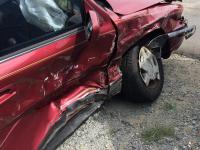Unlike Liability Insurance, collision and comprehensive insurance coverage are not required by most states. Unless you took out a loan to purchase the vehicle (in which case you are usually required to carry both comprehensive and collision insurance), comprehensive and collision are options you may or may not currently have. Both types of automobile coverage are different in how and when they will protect your vehicle, so knowing what type of coverage you have and what your deductibles are will give you peace of mind in the event of an accident. Also being aware of your coverage before you call your body shop will help avoid any miscommunications or misunderstandings with your representative with the body shop.
A Quick Look at Collision:
Collision Insurance coverage is optional insurance and usually pays to fix or replace your car if it is damaged or destroyed in an accident. A covered accident might include a single vehicle accident like a rollover, hitting another vehicle or hitting a stationary object like a fence, pole, or tree. Collision insurance may also cover if someone or something hits your car while it is parked.
Collision insurance does not cover damage done to your vehicle that is not related to driving like damage caused during or by storms, hail, falling objects like trees, hitting or being hit by an animal including birds, deer, pigs, and cows, fire, vandalism, theft or damage to another person’s vehicle caused by your vehicle. Collision insurance also does not help pay for any medical bills.
A Quick Look at Comprehensive:
Comprehensive insurance is also an optional automobile insurance that helps pay to replace or repair your vehicle if it is stolen or damaged in an incident that is not the result of a collision or rollover. These types of damages may include fire, flood, natural disaster, falling objects or civil disturbance.
Comprehensive insurance does not cover collisions with other vehicles or objects and does not cover injuries or fatalities.
Bottom Line: Talk with your insurance agent to be sure you have the vehicle coverage you need. Sit down with your agent and read through your policy, so you are aware of the coverage you do have. And sign up for any coverage or gap coverages you and your agent decide you need. This way, you won’t be surprised and unprepared when and if you need coverage after an accident or other unfortunate incidents in your vehicle.


